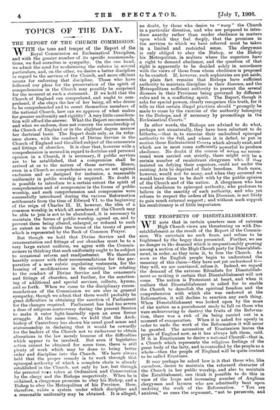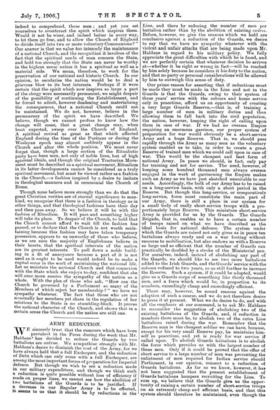THE PROSPECTS OF DISESTABLISHMENT.
WE note that in certain quarters men of extreme High Church views are threatening us with Dis- establishment as the result of the Report of the Commis- sion. We entertain no such fears, and refuse to be frightened by the bogey thus presented. Further, we see no danger in the demand which is unquestionably growing among a section of the High Church party for Disestablish- ment, in order, as they term it, to free the Church. As soon as the English people begin to understand the meaning of this claim—they have not yet understood it— they will, we are convinced, refuse it. Indeed, we regard the demand of the extreme Ritualists for Disestablish- nient as making it certain that Disestablishment will not come. The nation is Protestant at heart, and when it realises that Disestablishment is asked for to enable the Church to demolish the spiritual freedom and the comprehension with which she was endowed at the Reformation, it will decline to sanction any such thing. When Disestablishment was looked upon by the mass of the nation as a punishment ready to fall on those who were endeavouring to destroy the fruits of the Reforma- tion, there was a risk of its being carried out in a moment of exasperation. When it is asked for openly in order to undo the work of the Reformation it will never be granted. The accusation of Erastianism leaves the people of England now, as it has always left them, cold. If it is Enistianism to desire a national Church—that is, a Church which represents the religious feelings of the great body of the laity, and is controlled by the people as a whole—then the people of England will be quite content to be called Erastians.
It may perhaps be asked how is it that those who, like ourselves, desire to maintain the reformed character of the Church in her public worship, and also to maintain the Establishment, can think it possible to do this in view of the large and increasing number of Anglican clergymen and laymen who are admittedly bent upon undoing the work of the Reformation. "You are anxious," 80 runs the argument, "not to persecute, and indeed to comprehend, these men ; and yet you set yourselves to counteract the spirit which inspires them. Would it not be wiser, and indeed better in every way, to let them go free, and to allow the Church of England to divide itself into two or more voluntary Communions?" Our answer is that we value too intensely the mamtenanc,e of a national Church, and the recognition it involves of the fact that the spiritual needs of man concern the State, and hold too strongly that the State can never be worthy in the highest sense unless it has a spiritual as well as a material side. We mean, therefore, to work for the preservation of our national and historic Church. In our opinion, to secularise the nation would be to deal a grievous blow to its best interests. Perhaps if it were certain that the spirit which now inspires so large a part of the clergy were necessarily permanent, we might despair of the possibility of continuing the Establishment, and be forced to admit, however deadening and materialising the consequences, that a national Church could not be maintained. We do not, however, believe in the permanency of the spirit we have described. We believe, though we cannot profess to know how the change will come, that a great change may, when least expected, sweep over the Church of England. A spiritual revival as great as that which affected England during the time of the Puritans or during the Wesleyan epoch may almost suddenly appear in the Church and alter the whole position. We must never forget that, though a large section of the Ritualistic party have been men, not only of noble lives, but of high spiritual ideals, and though the original Tractarian Move- ment must be described as a spiritual movement, Ritualism in its latter developments cannot be considered as a truly spiritual movement, but must be viewed rather as a fashion in the Church,—a fashion inspired by a desire to imitate in theological manners and in ceremonial the Church of Rome.
Though none believe more strongly than we do that the great Christian verities are of eternal significance to man- kind, we recognise that there is a fashion in theology as in other things, and that theological fashions have their day and then pass away. So we believe it will be with the fashion of Ritualism. It will pass and something higher will take its place. To despair of the Church, to hold that the Church cannot afford to wait till the fashion has passed, or to declare that the Church is not worth main- taining because this fashion may have taken temporary possession, appears to us unworthy of those who believe, as we are sure the majority of Englishmen believe in their hearts, that the spiritual interests of the nation are its greatest interests. To pull down a noble build- ing in a fit of annoyance because a. part of it is not used as it ought to be used would indeed be to make a capital error in the work of maintaining the national life. 1.it us maintain the national Church and that connexion with the State which she enjoys to-day, confident that she will once more receive the sympathy of the nation as a whole. With the plea of those who ask, "How can the Church be governed by a Parliament so many of the Members of which reject her membership ? " we have no sympathy whatever. The fact that those who are not nominally her members yet share in the regulation of her relations to the State is no stumbling-block. It proves the national character of the Church, and shows that in a certain sense the Church and the nation are still one.



















































 Previous page
Previous page